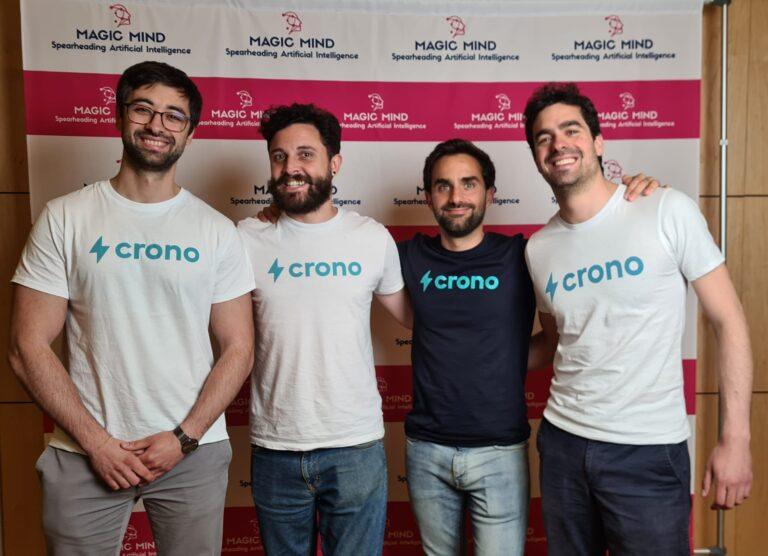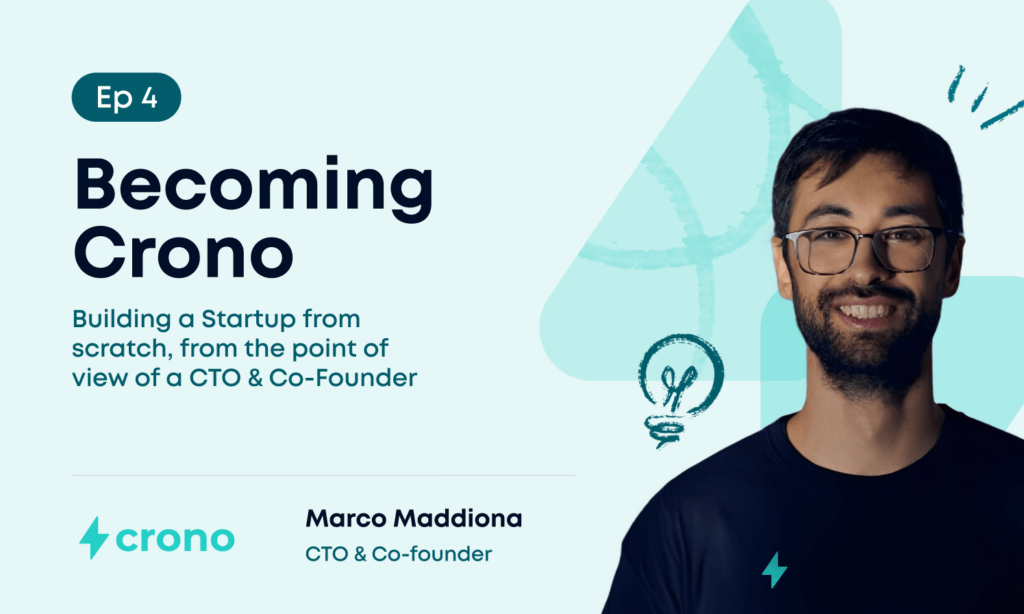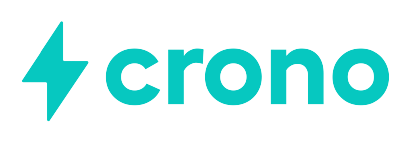Building a startup from an idea can be an exciting adventure that tests resilience, passion, and commitment. It’s about creating something entirely new and adopting the right mindset to turn it into a successful reality.
With “Becoming Crono” we’ll revisit our starting point through an honest and captivating memoir written by our CTO, Marco Maddiona.
Each month, you’ll have the opportunity to witness firsthand the steps that propelled Crono into a startup with a €500,000 pre-seed investment. This will encompass the obstacles we overcame and the choices we made. Have you ever wondered what it’s like to develop software while building a business?
If you are already on board then, enjoy our second episode of Becoming Crono!
Episode 4 – Funding & Building a Team
Hi Croners, I’m Marco Maddiona, CTO & Co-Founder of Crono, welcome to the fourth episode! In case you have missed the previous ones head here to read the very start of our adventure. Now, let’s dive right into our story!
The beginning of 2023 has been a whirlwind for Crono. We carried on and developed so many activities at the same time, that I have to stop for a moment to be able to isolate and focus on them. But, as usual, let’s proceed step by step.
Fundraising from business angels continued well and we managed to get close to the quota we had planned to set aside for them in the round. I believe that finding business angels who are experts in the field is paramount for an early-stage start-up as, thanks to their experience and network, many opportunities can be reached.
Moreover, this allowed us to raise some money to continue investing in the project while looking for an investor to lead the round.
As far as product development was concerned, we were still iterating on the feedback we received from customers, trying to introduce both improvements to the existing software and new features to make Crono the best tool in the outbound sales process.
How to develop a product as a CTO
Managing the development part alone, in the early stages of a start-up, is a fairly common situation that requires a lot of skills, flexibility, time and above all patience. It might happen that you have to fix the size of a text in your web application, while you are completing a database synchronisation, after you have just developed a new API and fixed a bug.
All in the space of 15 minutes.
Moreover, a developer wearing the role of a CTO always has to fight between their nature of writing clean, well-structured code and the need to implement functionality that may no longer be needed after 15 days.
For this topic, I can only recommend one of the articles that has most enlightened me during this journey: ‘Do Things that Don’t Scale‘ by Paul Graham (Y Combinator).
Add Your Heading Text Here
If you don’t have the time to read it I can (humbly) summarise it very quickly: in the beginning for a startup it is necessary to do things that don’t scale. It would be much more problematic to invest too much time in making the software totally clean, automated and scalable only to realise later that the product made is not actually what the user needs.
How long does it take to find the product the user needs? This is the question every founder would like to have answered. Finding the product-market fit is a very complex process where so many factors come into play. Even when you have precisely identified the customer’s needs, it is difficult to create the product that adheres to them as closely as possible, especially in the way the user expects.
So you find yourself immersed in a cyclic process where you try to get closer and closer to the best solution.
It is also a question of time, resources and different and necessary skills that are hardly ever fully present within the team at an early stage.
Although it is not possible to know in advance how long this process may take, everyone in the literature is quite convinced about how you realise you have reached product-market fit. When it feels like the business is bursting at the seams and that the whole machine can no longer cope with the flood of new customers.
That is the real panic moment for the CTO, because that is when you really have to worry about doing things that scale to make the software and infrastructure ready to support business growth.
Finding the right team-mates
At the beginning fo 2023, while searching for product-market fit, we realised that we needed support in software development.
Finding developers is notoriously a very difficult process. The main reason for this is that demand far outstrips supply. Moreover, the funnel gets narrower and narrower if you add the desire to find bright, proactive people, willing to change jobs and with the right amount of risk-taking and passion for innovation.
We juggled various channels (job post + direct contacts on LinkedIn, network of founders and colleagues, former professors) and thanks also to the precious suggestions of super smart HR friends we manage to get several interviews with developers intrigued by our project.
During the interviews, our enthusiasm for our ambitious project easily transpired, but it was not always obvious to find corresponding feedback from the other side. After all, how can a young start-up compete against the benefits of large multinational companies or the ordinariness of a small software house?
Even the first employees must share the same dream as the founders and have that spark in their eyes that entices them to revolutionise a specific sector, with the knowledge that the growth of the start-up will be directly proportional to what they can take and learn from it.
After several weeks of research and interviews, we were proud and happy to have found the perfect match for our project: Roberto Cornacchiari in front-end development and Leonardo Falco in back-end development.
Finally, funding
While tackling the issue of the composition of the tech team (developing the product, selling it and working on growing the brand) our focus was always on raising investment. Managing so many aspects all at once is not easy: they are all time-consuming activities, especially if you approach them for the first time.
Being four co-founders allowed us to divide our roles well and, with excellent internal coordination, we managed to carry out all the work that needed to be done. Fundraising was on our CEO Lorenzo, who for 6-7 months carried on full-time, brilliantly and tirelessly.
In early 2023, after a period of discussion, things got unblocked. We were at an advanced stage with three funds (two British and one Italian) that offered to lead the round as lead investors. At that moment we realised that there was concrete interest in investing. After having carefully chosen the lead investor, we needed to identify other 3-4 funds ready to come in with smaller tickets.
Fortunately, over the course of the previous months, we had met many players who were enthusiastic about Crono. Among them, we were able to choose super partners ready to participate in the round and support us in our growth.
After a few weeks, the final list was as follows: SFC Capital, Magic Mind, Startup Wise Guys, Aticco Ventures and Starseed Investments Pvt. Ltd.
(More details about our pre-seed funding here)

The beginning of prospecting revolution
Yes, six months after the release of our service on the market, we managed to raise our first investment round (pre-seed). There would be so many things to say about this as it was a real whirlwind of emotions for us, in a very hectic period, which we did not even have time to process.
Raising an investment round is first and foremost an important first validation moment for a start-up. This gave us an incredible charge and pushed us to do better and better and to want to prove the value we know we can achieve.
Of course, that was a testing ground for us. That is, we had found the necessary resources to continue to invest in the project, optimise the product and grow the number of customers, but we knew that we had to work even harder.
We celebrated the news in front of our computers without diverting too much attention from all the various ongoing activities. Aware that for us that was the first small milestone of a much longer journey still to come.
Summer was coming and more surprises and achievements with it: funding and building a team were just the beginning.
Thank you for reading so far. I hope that my memories and words have inspired you and given you the sense of what building a start-up from scratch feels like. If you liked this episode, feel free to share it with people who may appreciate it.
Crono’s story isn’t finished yet, the most exciting parts are yet to come, stay tuned!

